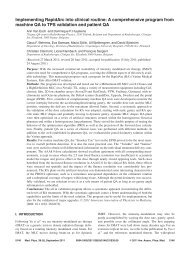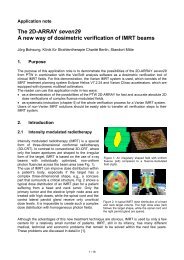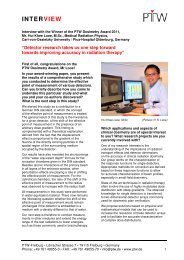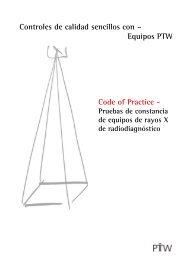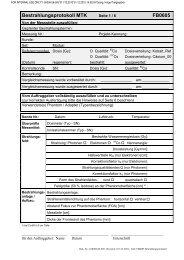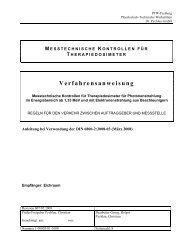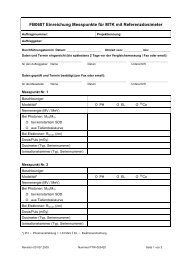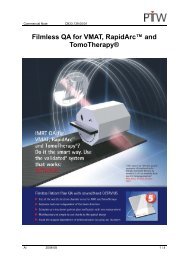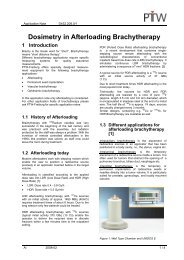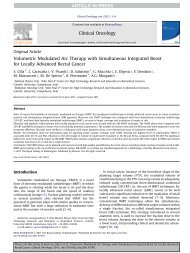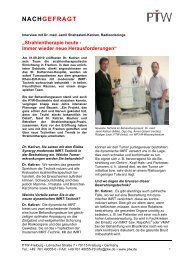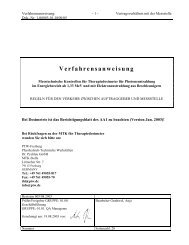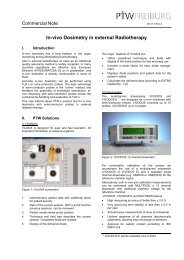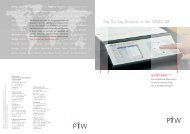Interview - PTW
Interview - PTW
Interview - PTW
Create successful ePaper yourself
Turn your PDF publications into a flip-book with our unique Google optimized e-Paper software.
INTERVIEW<br />
<strong>Interview</strong> with the Winner of the <strong>PTW</strong> Dosimetry Award 2010,<br />
Dr. Gregory T. Betzel, Department of Radiation Oncology,<br />
University of Maryland School of Medicine, Baltimore, Maryland, USA<br />
“Exploring diamonds in the interests of clinical dosimetry”<br />
Gregory T. Betzel, Ph.D. (Picture: G. Betzel)<br />
In your paper, you investigate the<br />
suitability of a CVD diamond detector<br />
for use in clinical dosimetry. What made<br />
you choose this topic for your research?<br />
My previous interest in detector research<br />
led me to explore projects that focused<br />
upon new materials and designs for radiation<br />
dosimetry. I found diamond to be a most<br />
interesting material with which to detect X-rays,<br />
and I knew previously of diamond detectors<br />
used in particle physics research at CERN.<br />
Dr. Stuart Lansley, an expert in diamond<br />
research at the University of Canterbury,<br />
offered an opportunity to work with him on this<br />
topic along with my mentors Dr. Lou Reinisch<br />
and Dr. Juergen Meyer.<br />
What did you find most challenging<br />
on this research project?<br />
The biggest challenge was starting the project<br />
from scratch. The project involved researching,<br />
designing and testing a number of prototype<br />
detectors that could then be evaluated in hospital.<br />
It was gratifying to choose basic electronic<br />
materials, perform material analyses on a variety<br />
of diamond films, and finally complete a number<br />
of irradiation studies utilizing a linear accelerator<br />
in a radiation therapy department.<br />
Congratulations on the <strong>PTW</strong> Dosimetry Award,<br />
Mr Betzel! Were you surprised to receive it?<br />
It was a delightful surprise and a great honor to be<br />
notified by <strong>PTW</strong> that my research on the suitability of<br />
CVD diamond detectors for use in clinical dosimetry<br />
that was carried out at the University of Canterbury in<br />
Christchurch, New Zealand, had been acknowledged<br />
through the <strong>PTW</strong> prize.<br />
How did you learn about the award and what<br />
motivated you to apply for it?<br />
My mentor Dr. Juergen Meyer was presenting at the<br />
DGMP Congress in Freiburg, and encouraged me to<br />
submit a paper reporting results from my PhD research<br />
for the prize.<br />
What are your future plans?<br />
Are there any other clinical or scientific<br />
projects that you would like to work on<br />
in the future?<br />
Following my PhD, I was able to continue my<br />
diamond detector research at the University of<br />
Canterbury. As I wished to continue my scientific<br />
training in a clinical environment, I accepted a<br />
postdoctoral research fellowship in the Department<br />
of Radiation Oncology at the University<br />
of Maryland School of Medicine, working on<br />
problems related to arc therapy.<br />
An American in New Zealand. What<br />
brought you to the University of<br />
Canterbury in Christchurch?<br />
After completing my MSc degree at Northern<br />
Illinois University in DeKalb, Illinois, I knew with<br />
confidence that I wanted to pursue a doctorate<br />
in Medical Physics. I researched numerous PhD<br />
programs both in the United States and abroad<br />
that interested me. I was very interested in<br />
University of Canterburgy in Christchurch,<br />
New Zealand, for several reasons; foremost<br />
was an opportunity to conduct cutting-edge<br />
medical physics research under the direction<br />
of Dr. Lou Reinisch, Dr. Juergen Meyer and<br />
Dr. Stuart Lansley.<br />
<strong>PTW</strong>-Freiburg • Lörracher Strasse 7 • 79115 Freiburg • Germany<br />
Phone: +49 761 49055-0 • FAX: +49 761 49055-70 • info@ptw.de • www.ptw.de 1
INTERVIEW<br />
New Zealand has always had a reputation for its<br />
world-class scientific enterprise, and is well known<br />
for its creative and innovative approach to the sciences.<br />
Together, an opportunity to work with outstanding talent<br />
in the medical physics field and in a progressive science<br />
community brought me to New Zealand. The beauty of<br />
the South Island and all that it has to offer in both<br />
recreation and outdoor activity made the experience all<br />
the more rewarding and enjoyable.<br />
What motivated you to take up Medical Physics?<br />
I initially pursued my graduate studies in the field of<br />
high-energy physics with a keen interest in accelerator<br />
and detector physics research. While I was working<br />
in collaboration with researchers at Fermi National<br />
Accelerator Laboratory, I became fascinated with<br />
a unique facility that was using neutrons to treat cancer.<br />
The seed was planted - and I wanted to learn more.<br />
After receiving my MSc from Northern Illinois University,<br />
I began to investigate a number of medical physics<br />
programs, and subsequently left for New Zealand to<br />
study Medical Physics.<br />
We would like to thank Mr. Betzel for the interview<br />
and wish him lots of success in his further career.<br />
Media Contact at <strong>PTW</strong><br />
Ute Wüstefeld<br />
Marketing Manager<br />
<strong>PTW</strong>-Freiburg<br />
+49 (0) 761 49055-591<br />
ute.wuestefeld@ptw.de<br />
Personal<br />
Dr. Gregory Betzel<br />
is currently a Postdoctoral<br />
Fellow in<br />
the Department<br />
of Radiation Onco-<br />
logy at the University of Maryland<br />
School of Medicine where he is<br />
performing research on fourdimensional<br />
treatment planning<br />
and delivery of rotational radiation<br />
therapy.<br />
He obtained his PhD in 2010 at<br />
the University of Canterbury in<br />
Christchurch, New Zealand, where<br />
he investigated the use of synthetic<br />
diamonds as X-ray detectors for<br />
clinical applications under the supervision<br />
of Drs. Juergen Meyer and<br />
Lou Reinisch. While completing<br />
an M.Sc. in Physics from Northern<br />
Illinois University (NIU), he gained<br />
experience contributing to research<br />
at Fermi National Accelerator<br />
Laboratory and Argonne National<br />
Laboratory.<br />
He worked for nearly three years<br />
in a professional engineering<br />
research and manufacturing<br />
environment following the<br />
completion of his B.S. in<br />
Industrial Engineering at NIU.<br />
Contact:<br />
Gregory T. Betzel, PhD,<br />
Department of Radiation Oncology<br />
University of Maryland School of<br />
Medicine, Baltimore, MD, USA<br />
+1 410-328-7074,<br />
gbetzel@umm.edu<br />
<strong>PTW</strong>-Freiburg • Lörracher Strasse 7 • 79115 Freiburg • Germany<br />
Phone: +49 761 49055-0 • FAX: +49 761 49055-70 • info@ptw.de • www.ptw.de 2



